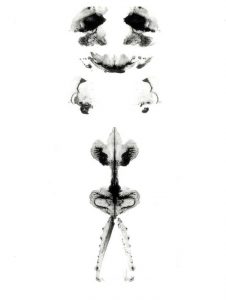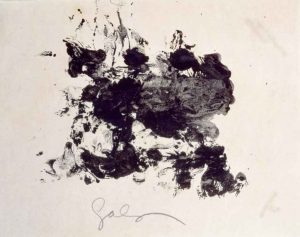We are pleased to display our recent acquisition, a 1932 exquisite corpse – a collaborative piece by Salvador Dalí, his wife Gala, surrealism leader Andre Breton and painter Valentine Hugo.
In creating an exquisite corpse, each “player” contributes a part of a drawing, folds the paper to conceal it, then passes it on to the next player for their contribution. The resulting image often resembles a monstrous creature – mismatched legs, torso and head. The goal was to utilize chance in producing something potentially more poetic than what an individual would produce.
In this exquisite corpse , Dalí provided the gun and knife; Gala added arches; Breton contributed hands and an upside down puppet; Hugo provided the foreshortened female torso. It is now on display in the Museum’s James Family Wing alongside two examples of decalcomania which is also a game as well as an artistic technique. The Surrealists enjoyed game playing as a source of poetic inspiration.
In decalcomania, ink is applied to a page, which is folded and opened to reveal an abstract symmetrical pattern. The artist then makes changes to bring out a suggested image. Dalí’s Head of Donkey resembles an insect when inverted; Gala’s Untitled/Decalcomania is asymmetrical, abstract and mysterious.
Image Credits: detail of Exquisite Corpse (1932), Dali-Dali-Breton-Hugo; Head of Donkey (1936), Salvador Dalí and Untitled/Decalcomania (1936), Gala Dali.


